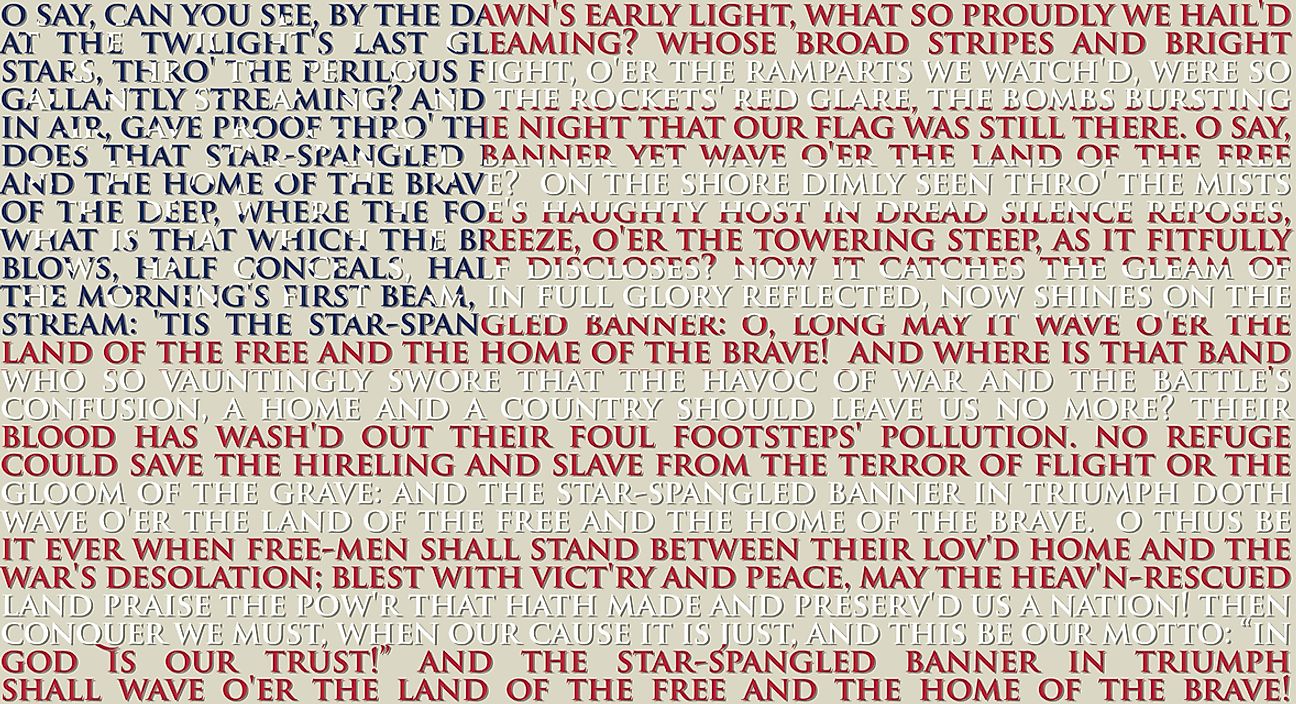What Is the Purpose of a National Anthem?

What Is a National Anthem?
A national anthem is a patriotic song or musical composition that is either recognized officially by a nation’s government and constitution or is accepted as such by convention through popular use. The national anthem reflects the history, struggles, and traditions of a nation and its people and serves as an expression of national identity.
When Is a National Anthem Used?
National anthems are usually played or sung during national holidays, especially during the independence day celebrations in a country. National anthems are also performed during cultural and other festivals in the country, usually marking off the beginning or the end of such festivals. National anthems are often performed in international sporting events. For example, in the Olympic Games, the national anthem of the winning team is played during the medal ceremony. National anthems of the participating nations are also played prior to the start of a game and usually, the anthem of the host nation is played last.
The National anthem is also an integral part of a school’s daily routine in some countries. In countries like India, it is mandatory to play the national anthem at the beginning of a movie in a movie theater. In some countries like China and Colombia, the national anthem is played at specific times of the day by radio and television channels. Thus, different countries promote their national anthems in different ways.
Most countries also mention several etiquettes to be observed while performing or listening to the national anthem like standing up, removing headwear, etc. Although the national anthem of a country is recognized within the country, the use of the anthem outside the country is dependent on the country’s recognition at a global level. For example, Taiwan is not recognized as an independent country by the Olympics committee. Hence, the national anthem of Taiwan is not performed in the Olympics and instead the National Banner Song is played.
What Is the Importance of a National Anthem?
The national anthem, like other national symbols of a country, represents the tradition, history, and beliefs of a nation and its people. Hence, it helps evoke feelings of patriotism among the country’s citizens and reminds them of their nation’s glory, beauty, and rich heritage. It also helps unite the citizens of the country by one single song or music. During the performance of the national anthem, citizens of a nation, despite their ethnic differences, rise up in unison and listen attentively or sing the song with great enthusiasm. Players also feel a great moment of pride when they receive a medal at an international sporting event while their country’s national anthem is played in the background. It gives them a feeling of having made their country proud. Students who listen to the national anthem in their schools learn to respect their nation and develop a sense of unity among themselves.
How and When Did the Concept of a National Anthem Develop?
The concept of a national anthem was first popularized in 19th century Europe. After their independence from European colonial powers, many of the newly-independent nations also composed their own national anthems and today, virtually every sovereign nation in the world has its own national anthem.
The Wilhelmus, the national anthem of the Netherlands, is the world’s oldest national anthem that was written during the time of the Dutch Revolt between 1568 and 1572.
The Kimigayo, the national anthem of Japan, has the oldest lyrics of any national anthem. The lyrics of the anthem has been derived from an ancient poetry that was written during the Heian period (794 to 1185). The music of the anthem was composed only in 1880.
The Spanish national anthem, the Marcha Real, is also one of the oldest national anthems and was written in 1761. The national anthem of the UK was first performed under the title God Save the King in 1619. The Hen Wlad Fy Nhadau which is the national anthem of Wales was the first national anthem to be performed at an international sporting event.
What Languages Are Used to Write or Sing the National Anthem?
Most national anthems are in the country’s official or national language since these languages are usually the languages of the majority of the country. However, in countries having more than one official or national languages, several versions of the national anthem in different languages might exist. For example, Canada’s national anthem, Canada, O Canada, uses both French and English lyrics since both are official languages of the country. The national anthem of South Africa uses five of the eleven national languages of the country.
The Creators of the National Anthems
Although the national anthems of each country are popular throughout the country, the creators of many of these anthems are either little-known or even unknown. For example, the author of the British national anthem “God Save the Queen” is disputed and unknown. In some countries, however, the national anthem’s authors are world-renowned composers or even Nobel laureates. For example, the national anthems of India and Bangladesh were both written by the first Asian Nobel Prize winner in Literature, Rabindranath Tagore. In other countries, national anthems have been composed by locally important figures like, for example, Rafael Nuñez, the former President of Colombia penned down the national anthem of the country.
What Is an Earth Anthem?
It is not only the sovereign countries of the world that have their own anthem, but international organizations and institutions also have their own anthems which are referred to as “international anthems”. For example, the Lullaby is UNICEF’s official anthem, the ASEAN Way is ASEAN’s official anthem, and the European Union uses the Ode to Joy’s tune as its national anthem.
With large-scale globalization in recent years, various artists have also created global anthems or "Earth Anthems” with the aim of uniting the people of the world and promoting love and tolerance for each other and respect for the planet they live in. However, a true global anthem is yet to be widely accepted. Although the UNESCO praises such ideas, an official song is yet to be adopted by the UN.



